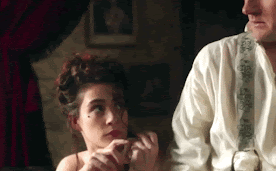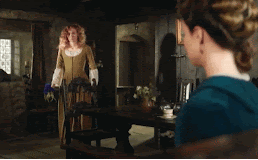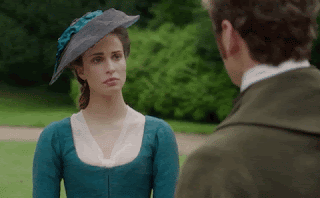"Not a changeable-minded woman! Was that what George thought her? ........, all that had happened was a result of it."
Thoughts of Elizabeth ('Warleggan' Book 3 Chapter 10)
Throughout the Poldark story Winston Graham continually developed the concept of Elizabeth as a woman who was more than susceptible to changing her mind. Though this concept is often identified as a feature of her relationship with Ross Poldark, when considering Elizabeth's changeableness in love, the astute reader will notice that in fact the concept of her 'changeableness' runs through all her love stories with the three men, Francis, George and Ross. Through them Elizabeth was presented as a character who on the particular matter of love and relationships was not particularly resolute and steadfast, but instead could change her mind according to her circumstances. In all this it appeared to be that there was a flighty and fickle nature to her love and loyalties.
This first post of two parts will explore Elizabeth's changeableness and fickleness in love with Ross and Francis, whilst the second will explore the same in regards to her relationship with George. However, whilst this post will touch on Ross, this will be quite lightly so as her change of mind with him will be dealt with in a more detailed step by step manner in the follow up post 'Elizabeth: Three Changes Of Mind Loving Ross Poldark'.
Story of a Changeable Love From A Changeable Woman
Three Men- Three Changes Of Mind- Ross First
Elizabeth was not at all consistent in her position and feelings for Ross. She changed her mind and her feelings for him a third time as she eventually seemed to move from what she may have thought was love (or at least fondness and affection), to feelings of hatred and antipathy. This was before seeming at peace with him from a distance but not necessarily in love with him.
Ross :The Fall Out Of Love- A Reason of Substance Or Fickleness?
In briefly addressing Elizabeth's first change of mind against loving Ross, there is a strong sense that this was due to his absence at war not making her heart grow fonder but instead more distant. She went astray with a better offer from the charming, present and wealthy (at the time) Francis. The impression is that she had a lack of true commitment and a flightiness in her love that some of the other female characters in the story did not have.
In respect of her changing position, even Elizabeth once asked Ross herself "Is it such an astonishment that a woman who changed her mind once could change it twice?" However in respect of that first change of mind, there is a saying that "Absense diminishes little passions but increases great ones." In Elizabeth's case the impression certainly is that Ross was not a 'great' passion or serious love before he left for war and she later told him herself that on reflection theirs was just a "boy girl attachment". That would explain why the passion diminished rather than blew up greater and stronger.
Indeed in comparison the teenage Morwenna in respect of Drake, Caroline in respect of Dwight and Verity in respect of Captain Blamey endured separations too. Theirs respectively were due to a forced marriage, capture at sea and family objections. Elizabeth did not have especially unfair treatment in the duration as these woman faced long separations too. It was five years for Verity, two years for Caroline and four years for Morwenna. Throughout their separations their love never diminished. Unlike them Elizabeth, as depicted in the book story was not unwavering and steadfast in her love for Ross. Her failure to be like this, irrespective of the obstacles in her way makes it reasonable to question the quality and realness of her apparent love for Ross by its lack of sturdiness from the very start.
Francis Too!- Elizabeth's Other Changeable Love
Elizabeth changing her mind on love was not just limited to Ross. Francis was a casualty of this affliction too.
Graham wrote into the story that Elizabeth herself had made it clear on at least three occasions that she had believed she was in love with Francis when she married him. In fact, across the books there are many more clearer references from Elizabeth to her having once felt she loved Francis than there are in respect of words and thoughts of her feeling herself to be in love with Ross. Also where Graham narrated around the issue of Elizabeth maybe not loving Francis in the 'ordinary sense', he never once spoke in the narrator's voice about the existence of a love by Elizabeth for Ross.
First Elizabeth had told Ross that "You went away and I met Francis. I loved him....Our tastes were the same and we loved each other.' Believing Ross thought that her mother was to blame for her decision to marry Francis Elizabeth doubled down saying that "What I have done I have done willingly and of my own mind." Then there was her statement to Ross at the Trevaunances' dinner party in 'Warleggan'. This is where she told him that she had married Francis because in her words "I thought I loved Francis better." Elizabeth further reiterated her initial feeling of love for Francis in the fifth book 'Black Moon' when she made another revealing admission. This time it was to Morwenna about her state of mind at the time when she married him. Here she said that "I married for what I thought was love,...."
All these revelations from Elizabeth confirm that at the time of her marriage to Francis, Elizabeth really did feel that she was in love with Francis. Her additional point that "..... and it did not last twelvemonth.", only serves to highlight that after a period of time and a 'change of mind' Elizabeth's feeling typically had then also changed from that first position.
Change When Love Falls Down (Or Never Really Was)
So with Elizabeth expressing to Morwenna, that just like she did with Ross she had changed her position on love for Francis, a pattern had emerged by her. By then it had been two men she loved only to fall out of love with. To Ross she had told him "I don't love you." Of Francis she had said her love did not last a year. It seemed apparent that where for Ross his absence extinguished a 'little passion', in contrast Francis's presence and the experience of married life did the same thing to her. Elizabeth's passion for Francis was no great one either. However, considering the way she explained herself to Morwenna perhaps what is significant is that she did not decide that she had just stopped loving Francis, but implied that she had never loved him in the first place. By telling Ross that their young love had just been a boy girl attachment she had done the same with him too.
Francis: The Fall Out Of Love-A Reason Of Substance Or Fickleness?
It can be easily misconstrued that Elizabeth fell out of Love with Francis because he had become a 'bad husband' and that would certainly make it a reason that had substance to it rather than just being a fickle one. However as explored in the post 'The Untold Story Of Francis Poldark (A disappointed And Lonely Man)' the astute reader will note that the timeline of this marriage breakdown in Graham's narrative does suggest otherwise and is one that is not so clearly depicted in the television adaptions. This post is looking at Elizabeth's attitude and commitment to love and not really Francis's. Francis own contributions and his persona as a 'Bad Husband' will be addressed in later posts. Indeed it was not that Francis did no wrong in the marriage but it was more about the sequence of events and the ordering of the factors in the downfall of this marriage. In addressing the doubt there is on what the trigger for the downfall of this marriage was, Graham cleared this up when he wrote in 'The Angry Tide' that it started with Elizabeth and where he said that her '..obsessive love for Geoffrey Charles had produced the first breach between herself and Francis long ago.' In retrospect, in spite of their position as supporting characters to the larger, more central and dominating love story of Ross and Demelza, there is still subtle narrative to be found in support of this idea. This is the narrative of Elizabeth being totally preoccupied with Geoffrey Charles and becoming a detached and unloving wife to a husband who was thoroughly disappointed and lonely due to her behaviour towards him. In one place Graham narrated that for Elizabeth motherhood was an 'all-absorbing task beside which ordinary duties became void.' So first Graham narrated Francis's disappointment and loneliness with Elizabeth. Then there was a three year time jump in the book where their story had moved on. It was after that time jump that Elizabeth first complained of his excessive gambling and then six months later of rumours that he was having an adulterous affair. These vices of Francis therefore presented as symptoms of what Dwight considered after Francis's suicide attempt was related to a source Elizabeth. He considered that it was because of '...Elizabeth, the loved but the unloving, the Galatea who never woke.'
The impression that Graham conjured up in his narrative, A suicidal Francis's disclosures to Dwight and Dwight's observations was that of the remote wife who really was just a wife in name only but not in loving nature. However, the idea that Elizabeth's maternal love for her new baby was part of the elements of her 'changing her mind' and turning away from loving her husband only adds to the idea of her love being flighty, fickle and too easily changeable in nature. Francis's indiscretions thereafter tell the story of how the problems in the marriage were compounded by this and this making a saving of the marriage unlikely without a quality love that could weather and beat the strain and mistakes made on both sides.
New Circumstances prompts A Fickle Change Of Attention Back To Ross
As touched on in other blogs such as ‘A Touch Of Red Dress Seduction’, Elizabeth engaged in a subtle pursuit and more flirtatious interactions with Ross thereafter after the demise of her marriage. Her motivations are addressed in the previous posts such as ‘Reaching Out For Ross’ and ‘A Competitive Spirit Against Demelza’. These suggest that Elizabeth decided to pursue Ross (or at least try to gain his attention and renew his romantic interest in her again) because her husband no longer loved her and she no longer loved him. After all Elizabeth did not ‘reach out’ to Ross and turn up on his door step until after four and a half years after his return to Cornwall and into her marriage. The timing was no coincidental. It was purposeful. Indeed these moves by Elizabeth marked another clear change and was conveniently at a time when the circumstances of her being in a mutually loveless marriage made Ross an attractive and alternative source for attention and admiration. Added to that was a spirit of competition which had ignited her internal outrage that Ross had fallen for someone she referred to as a ‘Beggar Girl’ (First and full edition of ‘Demelza’s). Her decision to seek ascendancy in Ross's mind was another clear 'change' triggered by the circumstance of Demelza. Graham narrated the source was jealousy but did not ever narrate it was love.
Whilst there was clear reason for Elizabeth's change of direction, essentially the motives were still arguably derived from ego. However, even if they weren't, the fickleness of it arises from Elizabeth only reaching out for Ross, not because of an ever and undeniable feeling of love that wouldn't have kept her away so long but because after four years of marriage there was a change of circumstances where it now served her interest, need or just her desire to make the moves she did. But this was not a strong pressing desire in the time when she had been happy and content in her marriage for most of the first year of it and if not that then at least while they were financially comfortable.
Fickle Love For Francis In Better But Not Worse
Unlike with Ross, after falling out of love with Francis Elizabeth did not declare any change of mind back to loving him at any later date. This was despite eight years afterwards in 'Warleggan' where Graham wrote that 'The relationship between them had been kinder these last two years, although it was never warm.'
Aside from Elizabeth's obsessive love for Geoffrey Charles, Graham's story telling about the Francis and Elizabeth marriage documents that their financial problems added to marital tensions. In the book there was the fact that Francis's mine closed five years into their marriage since it was not yielding ore. Also Francis who was most likely a victim of a gambling fraud by cheat Mathew Sansom suffered significant losses in his gambling when he was attempting to recoup losses made by the mine. From Verity's account Elizabeth made a show of kindness but was not a wife who was truly understanding and sympathetic. Verity told Ross in the second book 'Demelza' that "Elizabeth-well Elizabeth is very patient - perhaps her patience would be more fruitful if it had a little more understanding in it. " Indeed whilst the patience is commendable Elizabeth's fickleness could stem from an inability to see things from the other person's perspective and understand their feelings. Empathy is a quality to be discussed in respect of Elizabeth in upcoming posts but it does assist the explanation of her ease in emotionally 'checking out' and moving on instead of staying committed to a love. She was too fickle.
What if? :A Better Love If Times Got Better?
 Although the last two years of Francis and Elizabeth's marriage were kinder, (though not warm), the family were still impoverished. This may have made the difference in terms of Elizabeth not moving back to warmer and loving feeling for Francis. Given that Elizabeth's fickleness prompted many changes of mind from her at other times, this does compel the question of whether she may have changed her mind back to loving Francis if he did not die prematurely before reaching financial prosperity again.
Although the last two years of Francis and Elizabeth's marriage were kinder, (though not warm), the family were still impoverished. This may have made the difference in terms of Elizabeth not moving back to warmer and loving feeling for Francis. Given that Elizabeth's fickleness prompted many changes of mind from her at other times, this does compel the question of whether she may have changed her mind back to loving Francis if he did not die prematurely before reaching financial prosperity again. Sadly Francis’s joint business venture with Ross in reopening Wheal Grace became a success after Francis's premature death. Indeed since it turned everything around and brought Ross and his family financial prosperity and security, in the later books Graham wrote that Wheal Grace had been viewed as a '..fairy godmother for the Poldark for nearly twenty years..' Had he lived it would have been the same for Elizabeth and Francis too!
It is likely that over time the natural impact of Francis returning home each day with good news and updates on their finances and also a return to a more extravagant lifestyle, would have been to relieve one of the main sources of stress and tensions in his marriage with Elizabeth. It is an assumption but perhaps for a flighty character such as the one Graham built up for Elizabeth, in these better times she may have come to 'change her mind' again and feel herself being warmer to Francis and perhaps back in love with him again. After all Graham did show Elizabeth’s contentment with Francis seemed to correspond with when times were good in this material way.
Elizabeth's Contentment: A Material Contentment, A Fickle Contentment
It does seem that Elizabeth is often thought of as a tragic and sad character. However Graham shared a rare moment of Elizabeth feeling contentment before her marriage soured on Geoffrey Charles christening night. Taken from the first full edition of the second book 'Demelza' he narrated that this day was the 'peak of her happiness' in life. She happened to be 'sighing happily' thinking at the time that '..she and Francis had lived an extravagant care-free life....Life was good to her. It seemed unsympathetic to be happy; but life was good.' It was in the first full edition of 'Ross Poldark' that Graham wrote these thoughts of Elizabeth on their future prosperity and of when her father in law, Uncle Charles might die. She considered this would be when '...Francis became master of the house. The prospect was a pleasant one, herself at twenty-one as full mistress of this fine estate.'
As shown in her private thoughts much of Elizabeth’s contentment was associated with lifestyle and enjoying a circumstance of wealth and comfort. Therefore there might be little doubt that if Francis had lived on and been restored to a man of success in business, while also offering Elizabeth back the extravagant lifestyle they enjoyed in the early years of marriage, that there perhaps could have been an infectious impact on Elizabeth's feelings and renewed love of Francis. Having said this, quite unfortunately for Elizabeth observation of Francis by Ross in 'Warleggan' indicated that by then, in respect of Francis's feelings for her it was the case that 'His own jealousy (was) long spent and perhaps his love with it..' Therefore perhaps it was too late and any renewed love from Elizabeth would not have been reciprocated by Francis anyway. Except with continued kindness and just being a better family man.
In contrast to Elizabeth's changeable and fickle love, the story of Ross and Demelza, as set out in the post 'Love For Better Or Worse' documents that their true love remained in tact no matter the weather and the stresses they faced. Ross and Demelza's love was neither fickle or changeable. They remained together and in love for better or worse, in sickness and in health and for richer or poorer.
In contrast to Ross and Demelza's love, if it would require a breakthrough at their mine or some lucky windfall to cause Elizabeth to change her mind and feel back in love with Francis, then this would still demonstrate a fickleness in her love. That is the kind of conditional love that stays around in good but not bad time and in rich but not in poor circumstances. Instead of love during those tougher times there was only tolerance from Elizabeth. This is just as Elizabeth had told Morwenna. She had said that her love for Francis did not last a year and that "After that we tolerated each other."
Forever Love Of Substance If It Was Ross?
Elizabeth’s change in not loving Francis due to a new baby, financial problems and more excessive gambling does not assist the idea that she would have fared much better having married Ross. She would have faced the same experiences if married to Ross. Ross did not achieve financial security until ten years after his return to Cornwall. Despite the sabotage of his Carnemore Copper Company by George due to Francis's impulsive betrayal of him, Ross later admitted that this project had been doomed to failure anyway. His financial salvation came about due to a stroke of luck with Wheal Grace and Caroline's anonymous loan ensuring a reprieve for Ross from impending debtor's prison. Before then Ross partook in gambling in different ways. This was at the tables but he also gambled by taking high risk with his business decisions. This was even with his own liberty when he engaged in illegal trade and nearly got caught by the preventative men.
In light of Verity's observations of Elizabeth lacking understanding and true sympathy and also in light of her personal dreams to be a real mistress of a large estate with an extravagant and carefree lifestyle, the idea that Elizabeth would have remained ardently in love with Ross with no changes for those ten hard struggle years is unconvincing. This purely based on the character Graham established for her in the story. As will be seen in the post exploring her relationship with George, readers would see a different Elizabeth fight hard to make her marriage to him work but primarily because of material reasons. Such as ensuring a good inheritance for her sons. If for the purpose of this post love is the reason of substance and financial reasons were more of a fickle reason to make a marriage work, then Elizabeth's reasons for working hard at a marriage were not substantial and of the heart.
Of course, a presumption of a idyllic married life in all areas for Ross and Elizabeth had they been so would be unrealistic. In any case such a constantly fortunate and blessed scenario would not then be an indicator of the strength of their love if it were. It is likely that in the tough and realistic scenario depicted of Ross's early marriage with Demelza, that through all of Ross's shenanigans which sometimes caused the more steely and optimistic Demelza anxiety, Elizabeth 'little passion' of a love for Ross would have not been resilient to hold firm. In that case it is likely that just with Francis, Elizabeth would have got to a point in the marriage of getting by by just 'tolerating' Ross. Then presumably when Ross and Elizabeth had a child together, also just as she did with Francis Elizabeth would have found this ‘all absorbing’.
This again would be a distraction to ordinary tasks including the wifely commitment of expressing an ongoing and never waning love and attention towards her husband Ross. Just as he should show to her too. The commitment to love actively without a motive of just wanting to secure material needs would be required regardless of the emotional exhaustion. Yet Elizabeth's character had not demonstrated this ability without financial incentive as a motive. This had been the woman who had apologised to Ross at the start of the story and early into their love story for not keeping the 'faith' in committing and waiting for him to return from the war when as she later admitted she had believed him to still be alive. Nothing about Elizabeth's behaviour with Francis particularly inspires a belief that though she could not keep the faith and love for him during challenging times, that she would however be able to do so with Ross based solely on love as a motive.
Part two which explores Elizabeth's changes of mind and fickleness in her relationship and marriage with George Warleggan, her own perception of herself and why exactly she was changeable and fickle in love.
Menu of Blogs
Blogs that may be of interest
Seeds of Enmity, Fruit of War (Ross Vs George) Pt1
A Blossoming flower desperately seeking romance (Ross and Demelza: The Love Story)Pt3



























